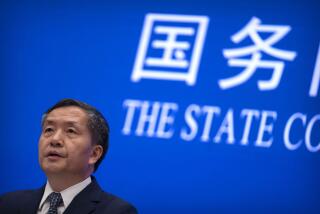China Dismisses Book on Tiananmen Square Crackdown
- Share via
BEIJING — In its first response to newly published documents that claim to show how top leaders decided to quash the 1989 Tiananmen Square protests, the Chinese government today rejected the papers and stuck to the party line.
The bloody crackdown in Beijing on June 4, 1989, was “highly necessary to the stability and development of China,” Foreign Ministry spokesman Zhu Bangzao said in a statement carried by the official New China News Agency. He said the Communist Party had reached the “correct conclusion” about the protests--that they were a counterrevolutionary rebellion--and would not revisit its verdict.
“Any attempt to play up the matter again and disrupt China by the despicable means of fabricating materials and distorting facts will be futile,” Zhu added, implying that the new documents are forgeries.
The papers, said to have been smuggled out of China by a disaffected official, have made headlines over the past few days for their detailed account of purported meetings and conversations by the Chinese Politburo over how to handle the burgeoning pro-democracy movement.
The papers vividly flesh out long-standing analyses that the crackdown was ordered by “paramount leader” Deng Xiaoping after a struggle between reformists who sought to placate the protesters and hard-liners who pushed for suppression.
Despite the documents’ shadowy provenance, many U.S.-based China scholars judge them to be authentic. An edited version, culled from thousands of pages of computer printouts, was released over the weekend as a book, “The Tiananmen Papers: The Chinese Leadership’s Decision to Use Force Against Their Own People.”
The unidentified official who leaked the papers reportedly decided to go public with the information out of impatience with the stuttering pace of political reform here.
Indeed, one of the targets of the release appears to be President Jiang Zemin, who became China’s top official after the massacre, which left hundreds, perhaps thousands, dead. According to the documents, party elders, including Deng, circumvented regular procedure in picking Jiang as the new party secretary, which could cast doubts on his legitimacy.
But whether the documents will have an effect on his tenure remains to be seen. Jiang himself was not directly involved in ordering tanks into Beijing to crush the protests. Since his abrupt ascension in the crackdown’s aftermath, he has worked methodically to shore up support among the party elite. A crucial test of his power will come next year, during a party congress at which Jiang is expected to try to anoint a successor.
Last fall, some analysts detected a weakening of his position when he failed to get one of his aides onto the Politburo. A recent angry outburst by Jiang in front of Hong Kong reporters also has been taken as a sign that his star has faded somewhat.
“His grasp on power may not be as firm as it seemed a year or two ago,” said Richard Baum, a political scientist at UCLA. “However, given that Jiang played no role in suppressing the student demonstrations in 1989, it is hard to see how the leak of these documents will hurt him personally.”
As expected, the “Tiananmen Papers” have received no mention in China’s official media, although news of their release has reached some Chinese through the Internet.
The Beijing regime has been single-voiced in its adjudication of what happened in June 1989. Previous speculation that it might reevaluate the incident has consistently come up short, especially since one of the main hard-liners at the time, Li Peng, remains No. 2 in the Chinese hierarchy.
More to Read
Sign up for Essential California
The most important California stories and recommendations in your inbox every morning.
You may occasionally receive promotional content from the Los Angeles Times.














